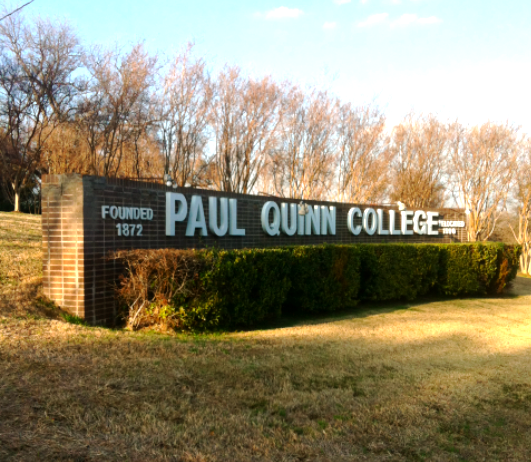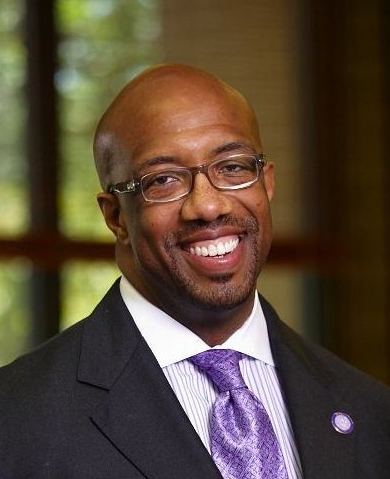
Who would think that a college that has faced years of financial instability and a one-time loss of accreditation could someday become one of America’s greatest small colleges?
Paul Quinn College President Michael J. Sorrell, that’s who.
President Sorrell came to Paul Quinn in 2007 to face the difficult task of restructuring the historically black school. The college, just south of downtown Dallas, is affiliated with the African Methodist Episcopal Church.
Improvements to the School
Since his arrival at Paul Quinn, President Sorrell has made many improvements to the campus, including a new admissions policy, the demolition of more than a dozen unused buildings, and the development of a sustainable garden.
The old admissions policy was non-existent at the time Sorrell joined the school.
The policy was “are you alive? Could you breathe? Worst admissions policy known to mankind,” Sorrell joked from his campus office one day recently, which he has filled with family photos, and inspirational posters and quotes.
Today, the admissions standards are more rigorous in order to better attract high achieving students. Prospective students now have to submit a 500-word essay along with a letter of recommendation and a photo of themselves. Students must have a minimum high school GPA of 2.5, they must submit SAT and ACT scores, and also must have a personal interview in order to be admitted.
“You can’t just oops your way into here,” said Sorrell.
One of Sorrell’s proudest moments at Paul Quinn happened in 2010 when the school demolished approximately 15 unused buildings in order to clean up the campus and make it a place where people want to spend time. Along with the demolition of the abandoned buildings, the school partnered with PepsiCo to create the Food for Good Farm, which has recently changed its name to the WE over ME Farm.
The college has turned its unused football field into a large garden, with the goal to provide food to parts of Dallas lacking in fresh produce
Celia Soto, a freshman and Presidential Scholar at Paul Quinn, said she is really impressed with the creation of the WE over ME farm. Soto thinks it is one of the great things that Sorrell has done for the school.
“You have to be really crazy or really smart to do that,” Soto joked about turning the unused football field into a farm.
In 2009, the Southern Association of Colleges and Schools ended Paul Quinn’s membership to the organization, resulting in the schools loss of accreditation because of financial instability.
In early 2011, however, Sorrell had another reason to celebrate Paul Quinn’s successes. Through the Transnational Association of Christian Colleges, Paul Quinn received accreditation again. Jessika Lara, Enrollment Management Officer at Paul Quinn, believes one of Sorrell’s most major accomplishments thus far is getting the school back on track to receiving its accreditation.
“You know, part of my problem is I don’t stop and smell the roses. I would tell you my greatest achievement hasn’t been done yet,” Sorrell said about his accomplishments with Paul Quinn.
Although Sorrell may not toot his own horn, he was happy to share that he is extremely proud of the family he and his wife Natalie have began to build. Sorrel and his wife have 20-month-old-son, Michael Augustus.
Leadership
The improvements made to Paul Quinn would not have been possible if it were not for the strong leadership that President Sorrell provides to the students and faculty.
Sophomore Presidential Scholar Valette Reese thinks that Sorrell’s best leadership quality is his likeability. Reese enjoys
Sorrell’s company because he helps teach her how to become a much better leader.
“He’ll fight for us,” Lara said.
Paul Quinn student Ryan Carrington works in Sorrell’s office and has gotten to know the President on a very personal level. Carrington says the “Prez” is able to see what people are really capable of.
“I don’t think I would be the leader I am today if it was not for Prez taking me under his wing,” Carrington said. Sorrell received his B.A. in Government from Oberlin College in Ohio. He attended Duke University, where he received both his J.D. and M.A. in Public Policy.
Sorrell enjoys playing basketball and being apart of committees and organizations that work towards improving the communities where he lives and the areas around him.
Never giving up on a person, idea, or a dream is very important to Sorrell. In order for someone to be a strong leader, Sorrell believes that you have to have a vision.
Vision for Paul Quinn
Sorrell hopes for the school to someday be viewed as a school for students with elite talent. He also trusts that one day the college will have strong financial stability. He aspires to raise a half of a billion dollar endowment for Paul Quinn.
Sorrell also wants the college to be viewed as the institution that tackles the challenges of under-resourced communities.
Finally, he wants Paul Quinn to be known for having the greatest turnaround story ever.
“We don’t dream small dreams,” said Sorrell.
But with huge dreams come huge challenges to overcome.
“My biggest challenge is getting people to believe that just because they haven’t seen it doesn’t mean they aren’t witnessing it,” Sorrell said.
Sorrell wants to incorporate the best aspects from many of the great, small, American colleges, starting with the intellectual fearlessness that the students of his own alma mater, Oberlin College, posses. Sorrell admires the historical value that colleges such as Williams and Amherst encompass. The president also respects the pride the women of Spellman College have for their school.
“I want the regalness that Spellman has for my students,” said Sorrell.
And finally, Sorrell loves the sense of community that the students of Whitman College, in Walla Walla, Washington, have fostered.
Sorrell does not have to look far to find a sense of community; Soto and Reese both say the community at Paul Quinn is like a tight-knit family.
“I feel like he is family to me, and I know he feels the same way about me. He is always pushing me to greater things in life, I have done things that I thought I could never do,” said Carrington.









